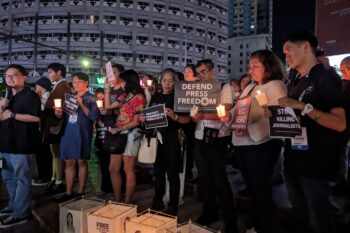CAGAYAN DE ORO (MindaNews / 09 January) — In previous years, thousands of devotees would fill the streets during the procession or “Traslacion” of the Black Nazarene here. This year, the Archdiocese of Cagayan de Oro and the city government canceled the yearly ritual to prevent the spread of COVID-19.
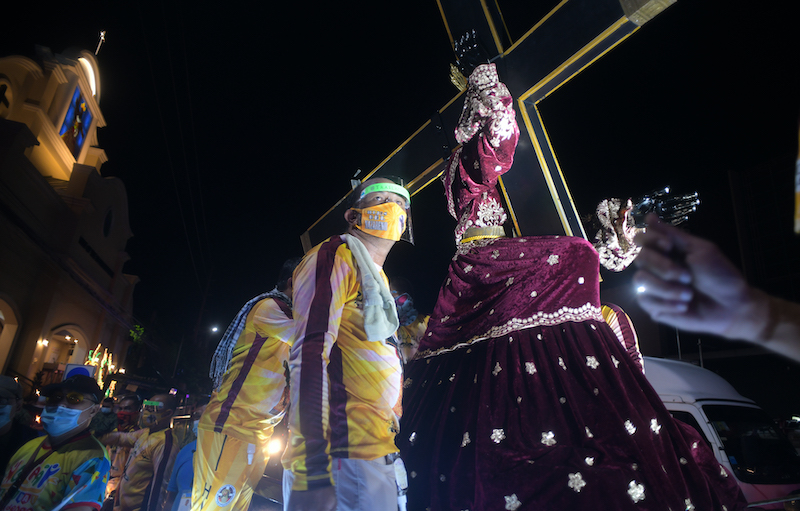 Members of the ‘Hijos,’ a group of men who swore to protect the icon of the Black Nazarene in Cagayan de Oro City, stand beside it on the back of a truck during the motorcade at 10 p.m. on Friday, 8 January 2021. The Archdiocese of Cagayan de Oro and the city government cancelled the annual procession to prevent the spread of COVID-19. MindaNews photo by FROILAN GALLARDO
Members of the ‘Hijos,’ a group of men who swore to protect the icon of the Black Nazarene in Cagayan de Oro City, stand beside it on the back of a truck during the motorcade at 10 p.m. on Friday, 8 January 2021. The Archdiocese of Cagayan de Oro and the city government cancelled the annual procession to prevent the spread of COVID-19. MindaNews photo by FROILAN GALLARDO
In lieu of the procession, the Archdiocese brought out the life-size replica or the “Callejeron” of the Black Nazarene from the Nazareno parish church in Barangay Lapasan and placed it on the back of a truck for a motorcade around the city on Friday night.
The city government made sure that devotees would not be around by holding the motorcade at the start of the daily curfew at 10 p.m.. The city’s curfew is from 10 p.m. to 5 a.m.
Only a few devotees dared brave the risks of infection outside the church at around 6 p.m., their candles lit, as they waited for the start of the motorcade.
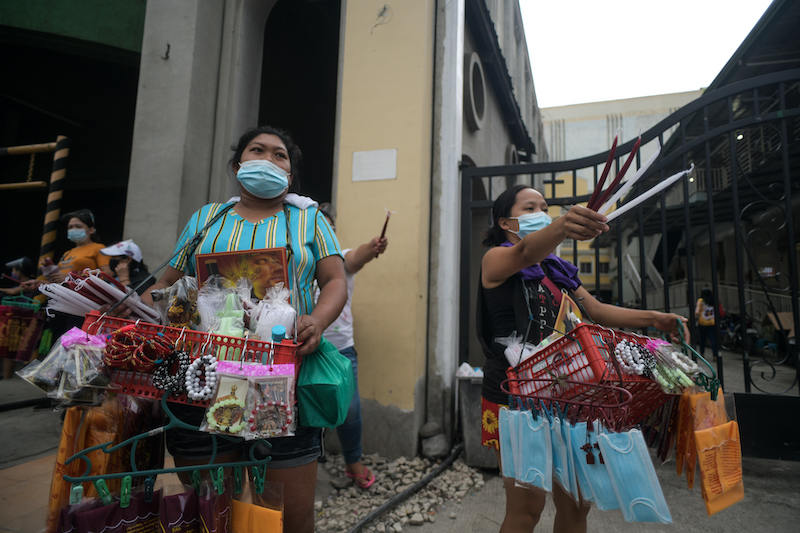 Vendors of Black Nazarene paraphernalia did not enjoy brisk sales outside the Nazareno parish church on Friday, 8 January 2021 because only a few devotees came. The Archdiocese of Cagayan de Oro and the city government cancelled the annual procession to prevent the spread of COVID-19. MindaNews photo by FROILAN GALLARDO
Vendors of Black Nazarene paraphernalia did not enjoy brisk sales outside the Nazareno parish church on Friday, 8 January 2021 because only a few devotees came. The Archdiocese of Cagayan de Oro and the city government cancelled the annual procession to prevent the spread of COVID-19. MindaNews photo by FROILAN GALLARDO
Late Friday afternoon outside the Nazareno parish church, sellers of religious paraphernalia complained of poor sales. “We will be lucky if we sell 500 pesos today,” a vendor said.
Before the COVID-19 pandemic, the Feast of the Black Nazarene drew thousands of devotees from the city and other parts of Mindanao since it started in 2008.
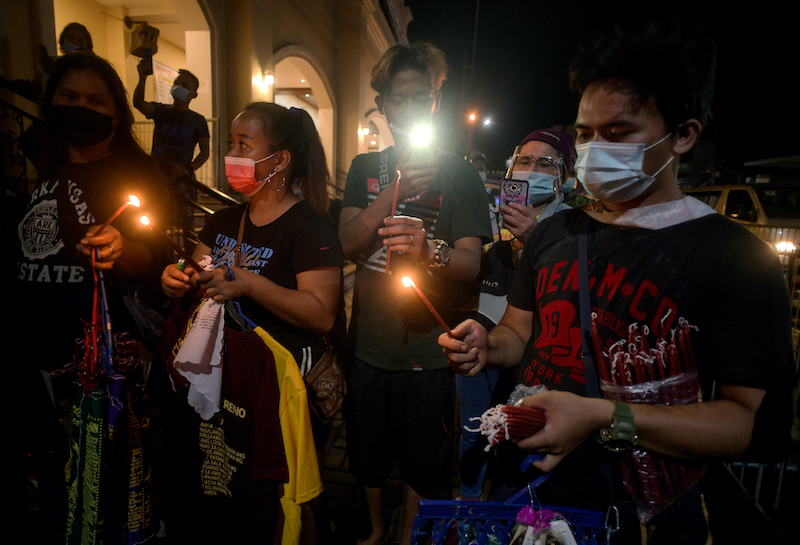 A few devotees brave the risks of COVID-19 infection to pray outside the Nazareno parish church on Friday, 8 January 2021, as they wait for the start of the motorcade at 10 p.m., start of the curfew. The Archdiocese of Cagayan de Oro and the city government cancelled the annual procession to prevent the spread of COVID-19. MindaNews photo by FROILAN GALLARDO
A few devotees brave the risks of COVID-19 infection to pray outside the Nazareno parish church on Friday, 8 January 2021, as they wait for the start of the motorcade at 10 p.m., start of the curfew. The Archdiocese of Cagayan de Oro and the city government cancelled the annual procession to prevent the spread of COVID-19. MindaNews photo by FROILAN GALLARDO
The only one of its kind in Mindanao and a much tamer version than that of Quiapo in Manila, devotees from all over Mindanao who cannot afford the cost of traveling to Quiapo, would flock to this city instead.
The procession Friday night was the second during the pandemic when the life-size image of the Black Nazarene was brought out for a motorcade.
On Good Friday, April 10 last year, the religious icon was also taken out of the church for a procession in the city, also during the curfew.
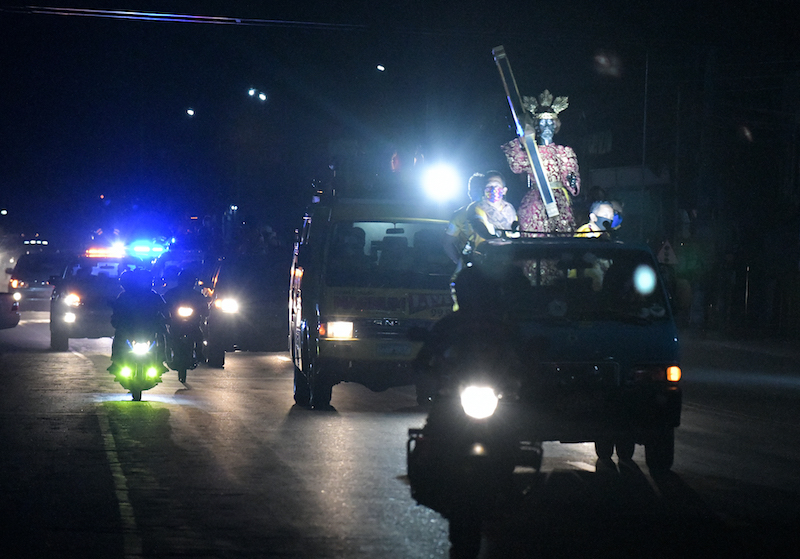 A motorcade brings the image of the Black Nazarene(right) around the empty streets of Cagayan de Oro during curfew hours on Good Friday, 10 April 2020, to seek its protection against the novel coronavirus disease (COVID-19). MindaNews photo by FROILAN GALLARDO
A motorcade brings the image of the Black Nazarene(right) around the empty streets of Cagayan de Oro during curfew hours on Good Friday, 10 April 2020, to seek its protection against the novel coronavirus disease (COVID-19). MindaNews photo by FROILAN GALLARDO
Father Der John Faborada, spokesperson of the Cagayan de Oro Archdiocese said their parishioners have continued to cling on to their faith in the midst of this highly contagious disease.
“We see our masses are well-attended despite the limitations of social distancing and our confessionals are full,” he said.
Faborada said the archdiocese has also adapted to the situation by livestreaming their masses and other religious rites.
“We are engaged in the social networks and Facebook. We have a local radio station to send our message,” he said.
The Archdiocese, he added, also responded to the call for food assistance by Lumads (Indigenous Peoples) in the hinterland villages and by the victims of the 2011 Typhoon Sendong who were relocated in Barangay Lumbia.
Faborada also said they are training first responders who can immediately help victims of abuse and suicide cases.
“The pandemic has reared its ugly side. There is a rise in cases of wife-beating and suicide. The Archdiocese is responding to these problems,” he said. (Froilan Gallardo / MindaNews)
